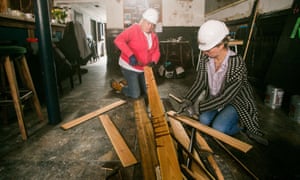Down by the docks this post-industrial, post-imperial city is growing a new economy. The latest article in our new economics series explores how it took back control

Looming over one of the poorest parts of Plymouth, which is to say one of the poorest parts of Britain, is a giant graveyard. Its buried are not men and women, but the carcasses of 13 nuclear submarines. Some have been dead for decades, such as the HMS Conqueror, which sank the Belgrano 36 years ago. Nine still have nuclear fuel rods, and there have been repeated leaks of radioactive waste. The Ministry of Defence claims all are safe. Then again, it sometimes doesn’t even disclose breaches until months later, when MPs and journalists have had to winch out the truth.
And so the neighbours worry. Some mention the children they send to the primary school next door. Yet the boats are unlikely to be dismantled or moved any time soon. Britain lavishes official attention on the well-off, whether in David Cameron’s old seat of Witney or in Theresa May’s Maidenhead. But down by the docks in the ward of Devonport, over 40% of children grow up in poverty – a depth of disadvantage that arouses from Whitehall little more than a shrug.
To read the rest of this article, please visit: Post-industrial Plymouth was broke. So it took business into its own hands




